If you’re searching for ways to grow your local business, showing up at the top of Google is one of the most powerful strategies available. But how do you actually get there? For many business owners in Ocala, the answer is clear: hire an SEO expert.
But not all SEO experts are created equal. In fact, hiring the wrong one can waste your budget, damage your site, and leave you worse off than when you started. This guide will walk you through exactly what to look for when hiring an SEO expert in Ocala—and what red flags to avoid.
While national SEO agencies might promise big results, a local SEO expert understands the Ocala market. They know the search behavior, the local competition, and what actually works to rank in this specific region.
Hiring a local SEO expert in Ocala also means better alignment with your business goals. They can:
For businesses relying on local foot traffic or regional clients, this geographic precision is critical.
When you hire an SEO expert, you should expect more than keyword stuffing or generic reports. A reputable Ocala SEO consultant should offer:
They begin by reviewing your website’s current performance, identifying technical issues, speed problems, or indexing issues that may be holding you back.
From your Google Business Profile to NAP (Name, Address, Phone) consistency, they optimize every local signal Google cares about.
They research terms like "[your service] in Ocala," ensuring you're targeting what potential customers are actually searching for.
Blogging, landing pages, and on-page SEO are all part of the package. Strong content not only attracts users but boosts your rankings over time.
This includes mobile responsiveness, site speed, clean URL structures, and schema markup—all of which directly affect your search rankings.
A good SEO expert in Ocala will help you earn backlinks through outreach, partnerships, and citations—not shady tactics.
You should know what’s being done, why, and what the results are. If they can't explain their work, that's a problem.
Want to see the tactical side of SEO? Read our guide on improving your Google ranking in Ocala.
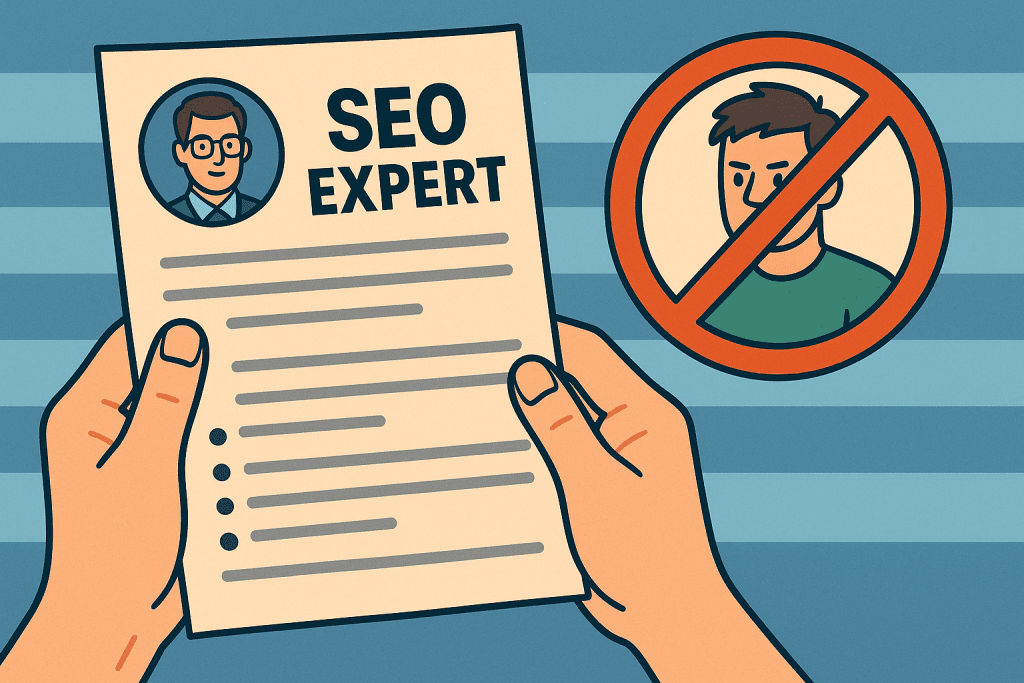
Unfortunately, the SEO world has its share of bad actors. Here are red flags to watch for when evaluating SEO experts:
No one can guarantee a #1 spot on Google. If they do, run.
Link farms, keyword stuffing, and cloaking might give short-term results but can get your site penalized.
If they don’t know what "Tuscawilla Park" is or can’t name Ocala competitors, they’re not local experts.
You should have regular access to reports and explanations of what’s being done.
Every business is different. SEO services should be customized to your goals and challenges.
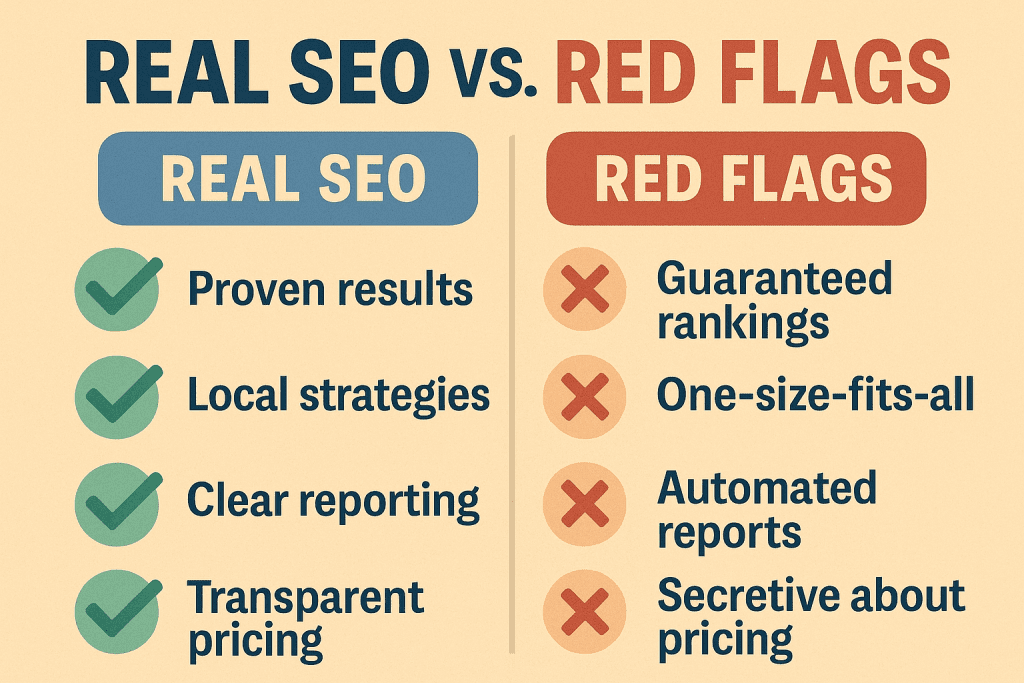
Here’s how to ensure you’re hiring the right professional:
The best SEO results come from long-term collaboration. You want a partner who learns your business inside and out and evolves their strategies as your goals change.
At Webway Studios, we focus on long-term relationships. Our SEO services in Ocala are designed to grow with you—not just deliver short-term boosts.
SEO doesn’t work in a vacuum. Your website design and your content strategy play major roles in your ranking potential.
Our website design services are built with SEO in mind, and our blog content is created to support your entire digital marketing strategy.
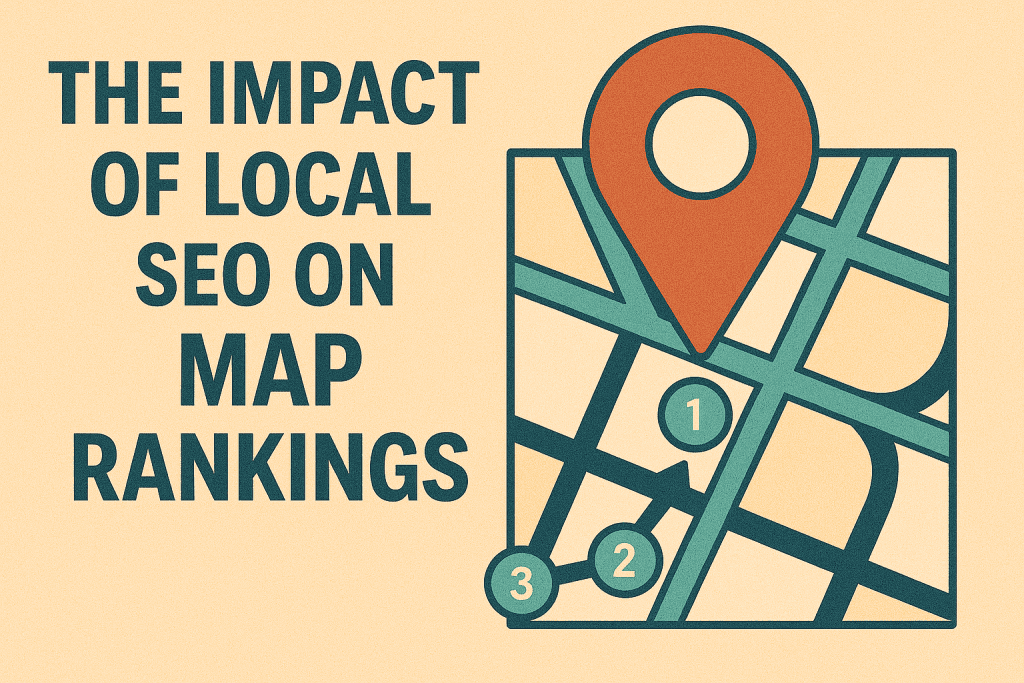
If your goal is to rank in the local pack (Google's top map results), you need more than just on-page SEO. You need:
We also recommend visiting our Ocala location page to learn more about how we support local businesses.
If you're serious about getting found online and attracting more local customers, it's time to partner with someone who knows both SEO and Ocala. At Webway Studios, we bring a local-first mindset, transparent communication, and real results.
Let’s build your visibility. Let’s grow your business.
We proudly serve businesses across Florida, including:
…and more throughout the state.
Avoid the fakes. Invest in real results. Work with a partner who knows Ocala and knows SEO.
Last updated: August 2025
Imagine this: a potential customer in Ocala searches for the exact service you provide, but your business doesn’t show up on the first page of Google. You just lost that customer to someone else. Ranking high on Google isn't just about vanity; it's about visibility, trust, and ultimately, revenue.
In a growing market like Ocala, local search results matter more than ever. Whether you're a landscaper, CPA, restaurant owner, or retail shop, showing up at the top when someone types "[your service] near me" can make or break your business.
Quick Stat: 46% of all Google searches are looking for local information. If your Ocala business isn’t optimized for local search, you’re missing a massive opportunity.
Before you can fix your SEO, you need to understand what factors affect it. Google uses over 200 ranking factors, but the key areas for local businesses include:
Let’s walk through how to improve each of these areas.
Your Google Business Profile (formerly Google My Business) is one of the most powerful tools for local SEO.
Checklist for optimization:
Want us to manage your Google Business Profile? Explore our SEO services
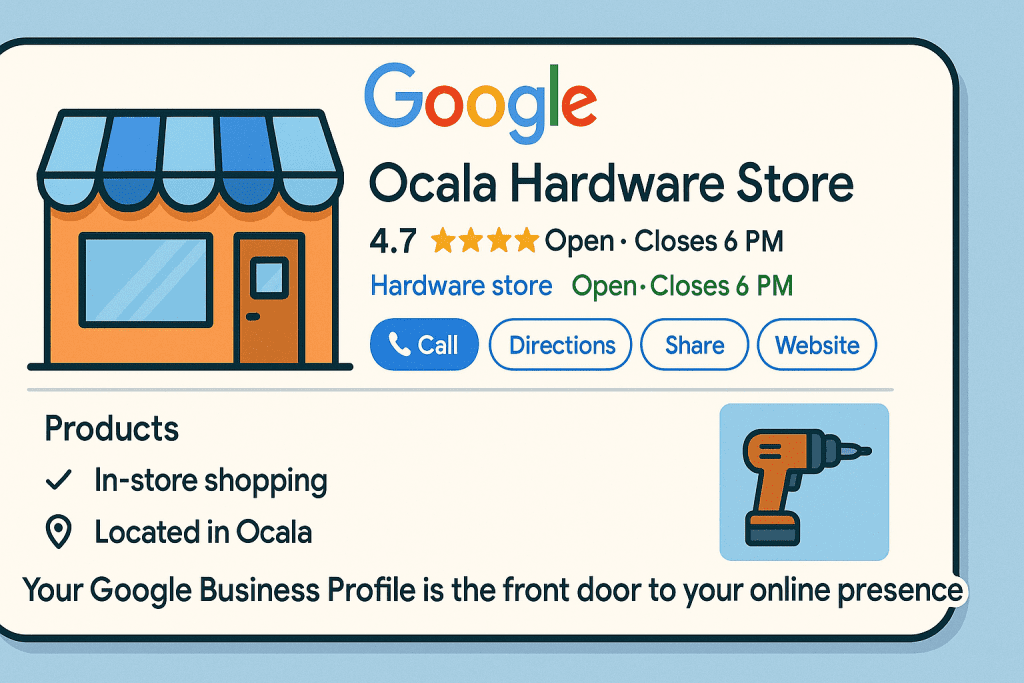
Google needs to understand that you serve Ocala. You can help it by:
Not sure if you should DIY or hire help? Learn how to hire an SEO expert in Ocala.
Bonus Tip: Use tools like SEMrush or Google Keyword Planner to identify long-tail keywords like "best web designer in Ocala" or "Ocala lawn care tips."
Need help writing SEO-friendly content? See how we create blog content that ranks.
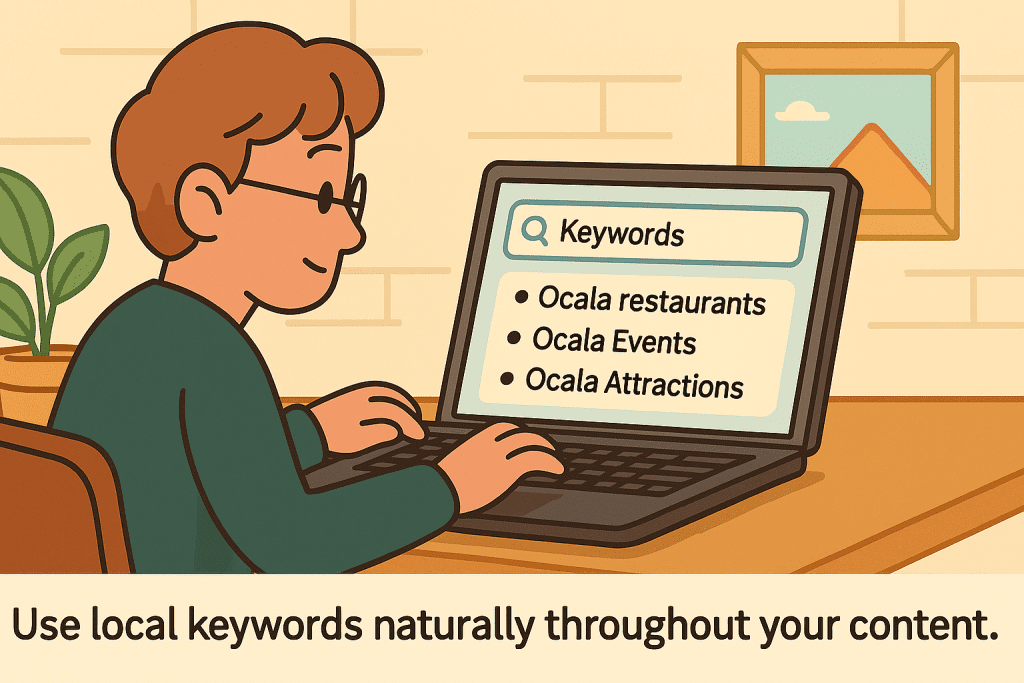
Page speed is a ranking factor. If your site loads slowly, Google may penalize it. Plus, visitors will bounce before they ever learn about your services.
Use tools like:
Quick Fixes:
Want faster load times? Explore our website design
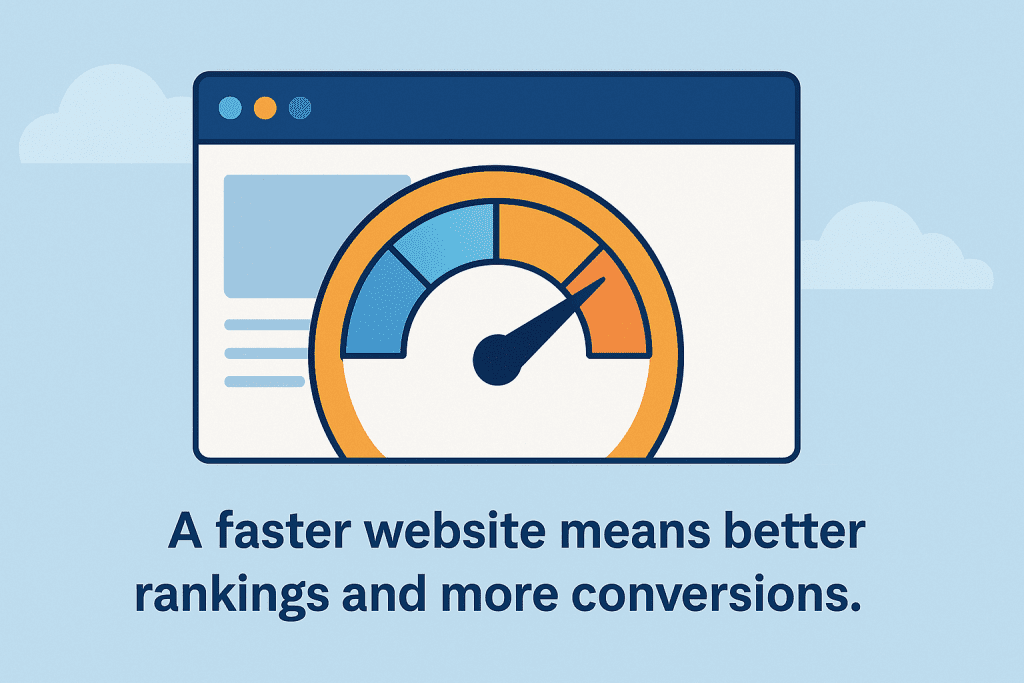
More than 60% of local searches happen on mobile. If your site doesn’t work well on phones, you’re losing traffic and rankings.
Things to check:
Google offers a free Mobile-Friendly Test. Use it.
Need a mobile-friendly website? See our website design services
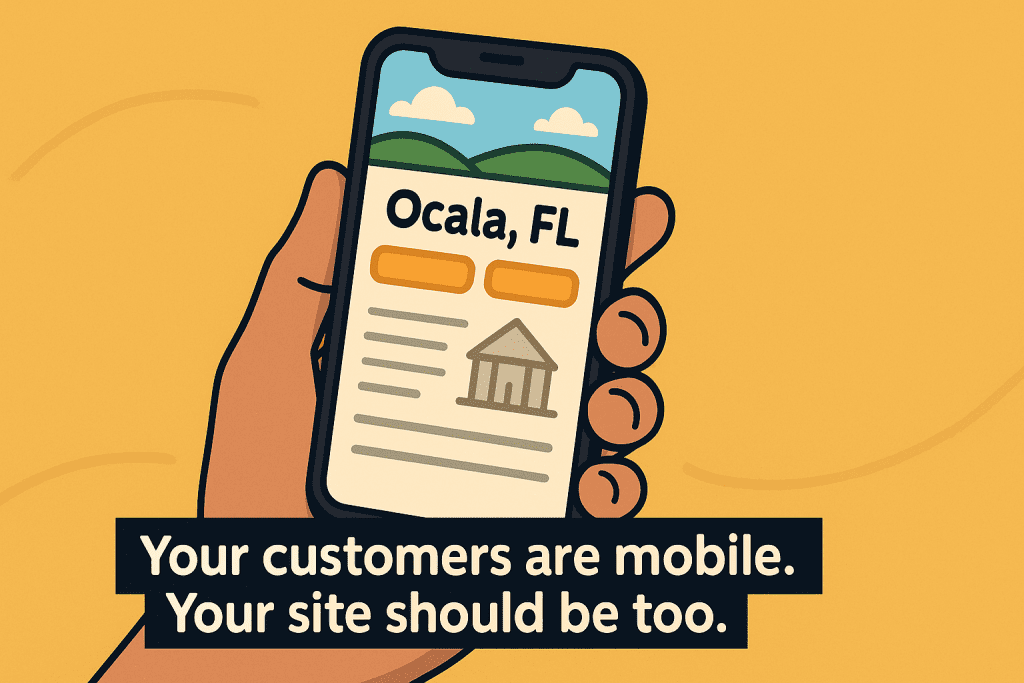
Backlinks act like votes of confidence. But for local SEO, local backlinks are the gold standard.
Where to get them:
Want help building your local authority? Let us create your backlink strategy
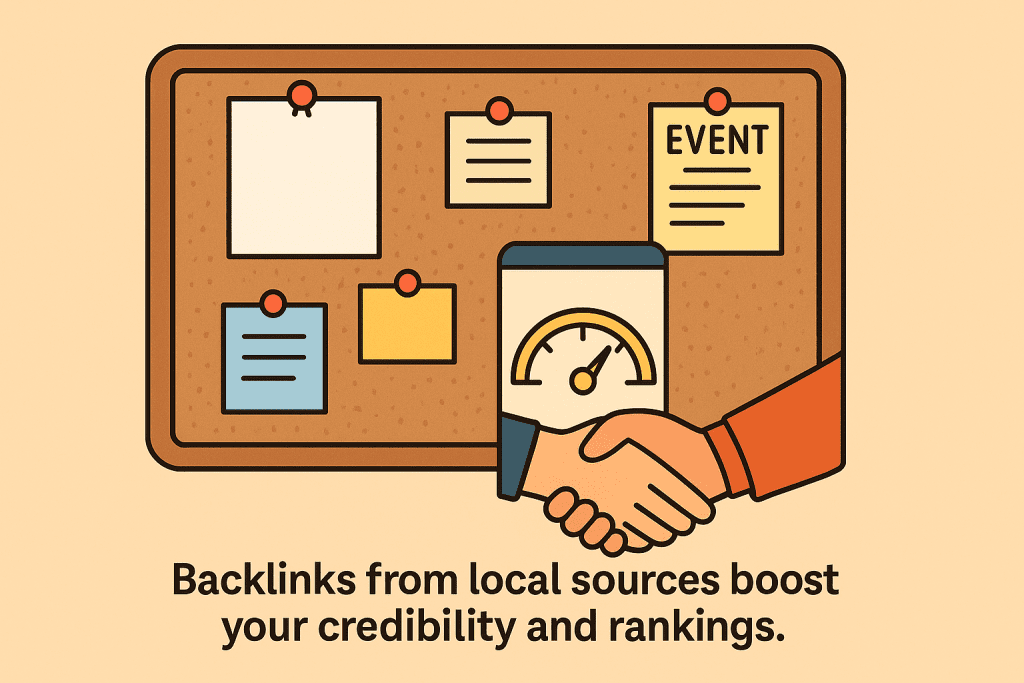
Reviews directly impact your map rankings and click-through rates. You should:
Pro Tip: Set up a QR code in your store or include a direct review link in your follow-up emails.
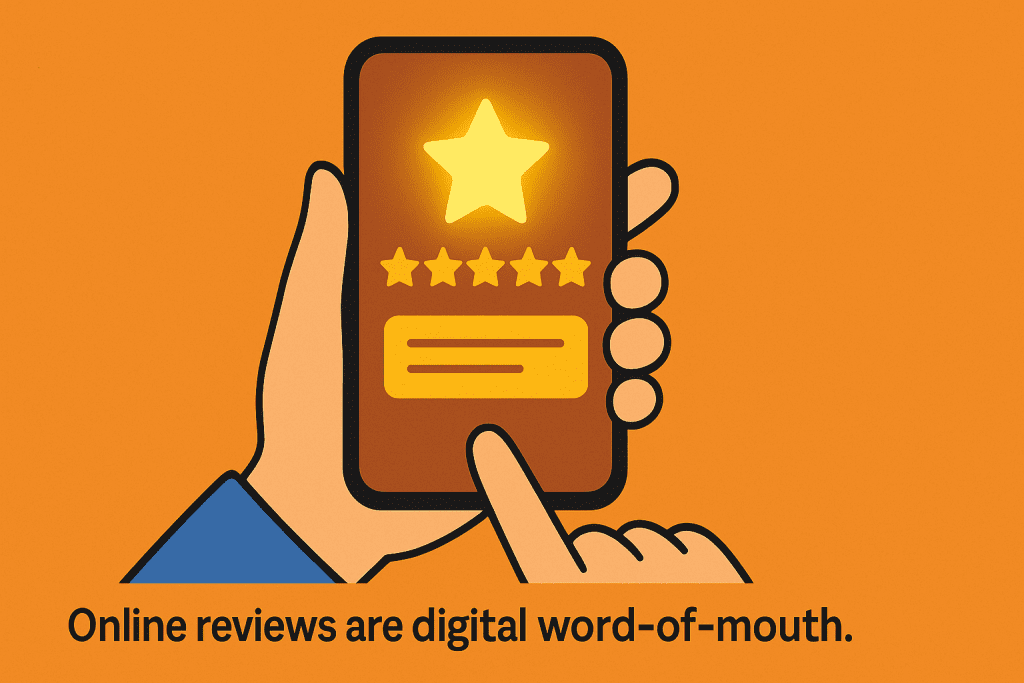
NAP = Name, Address, Phone Number. Consistency is key across:
Tools like Moz Local or BrightLocal can help you track your listings.
Google loves active websites. You don’t need to blog every day, but consistent updates show that your business is alive and relevant.
Your website design also impacts SEO. See what Ocala businesses need to know about web design.
Ideas for blog posts:
Not sure what to write? We handle blog content for businesses like yours

SEO is not a one-and-done task. Use tools to measure progress:
Set a monthly reminder to check performance and refine your strategy.
We proudly serve businesses across Florida, including:
…and more throughout the state.
Improving your Google ranking in Ocala won’t happen overnight. But by staying consistent, providing value, and optimizing your digital presence, you can rise above competitors who are asleep at the wheel.
At Webway Studios, we specialize in helping Ocala businesses succeed online — from SEO to website design to content creation.
Ready to improve your Google ranking? Schedule a free consultation
Last updated: August 2025
Owning a business in Ocala comes with its own set of challenges. You’re doing everything you can to serve your customers, manage your team, and keep things moving forward. But when it comes to your online presence, it can feel like you're falling behind, especially when you see competitors showing up on Google and you’re nowhere to be found.
We’ve worked with a lot of small businesses in the area. Most of them don’t have a huge marketing budget or an in house team. What they do have is passion for what they do, and a desire to grow. That’s where the right digital strategy can make a big difference and why working with a local digital marketing studio matters.
When you search for help online, you’re likely to come across big agencies or platforms promising instant results. But the reality is, cookie cutter strategies rarely work for businesses in places like Ocala. The approach that works in Miami or New York doesn’t always translate here.
A digital marketing studio that knows the area understands how local customers search, what they care about, and how to build trust. At Webway Studios, we help businesses stand out online in a way that feels authentic — not salesy, not pushy, just real.
Whether you're running a lawn care service, a retail shop, or a local law firm, your online presence needs to match the professionalism and care you bring to your customers in person.
Your website is often where people form their first impression of your business. If someone in Ocala is searching online for a service like yours and clicks on your site, are they seeing something that builds trust or something that makes them click away?
We’ve seen too many local businesses with outdated websites that don’t reflect how great they are in real life. If your site is hard to navigate, slow to load, or missing clear calls to action, you’re losing leads before they even pick up the phone.
That’s why we offer custom website design services built for conversion. We make sure your site works well on mobile, loads fast, and guides people exactly where they need to go — whether that’s scheduling a call, requesting a quote, or learning more about what you offer.
Even if you’re not ready for a full redesign, small improvements like updating your calls to action or reorganizing your service pages can make a noticeable difference.
If your business isn’t showing up when people in your area search for the services you offer, chances are your competitors are. Being easy to find online isn’t just helpful, it’s what drives new customers to your door.
Local SEO is about making sure your business shows up when people in your area are searching for what you offer. It’s more than just adding some keywords to your homepage. It involves:
We offer SEO services for small businesses that are designed to increase visibility without making things complicated. We’ll explain what’s working, what’s holding you back, and what we can do to move you forward.
Many of our clients don’t care about the technical details, they just want more people to find them online. That’s exactly what we help with.
One of the easiest ways to improve your rankings and give potential customers confidence in your business, is to publish helpful blog content.
See why blogging boosts SEO in our post on the role of blogs in website SEO.
Let’s say someone searches for “website development services” or “digital marketing Ocala.” They’re probably looking for answers to questions like:
Want step-by-step ranking tips? Read our guide on improving your Google ranking in Ocala.
A blog post that speaks directly to those questions helps you show up in search and positions you as the expert.
We use blog content not only to target new keywords but to support your main service pages through internal links. That helps Google understand how your site is structured and keeps visitors moving through your site.
Explore our SEO Services
See how we approach Website Development
We recently saw a drop for “website designer Ocala” going from page 1 to page 6. That’s a serious dip, and it can happen for a number of reasons: changes in Google’s algorithm, competing content, or a drop in engagement on your page.
Here’s how we fixed that:
These steps help regain lost visibility while strengthening your local presence long term.
If you sell products, whether it’s clothing, crafts, or custom items, you’ve probably thought about setting up an online store. And if you already have one, you might be wondering why it’s not bringing in more sales.
A lot of business owners in Ocala come to us after trying platforms like Etsy, Shopify, or Wix, only to find that their site isn’t showing up in Google searches or converting visitors into buyers.
That’s because successful ecommerce takes more than just putting products online. It’s about how your site is built, how it looks on mobile, how easy it is to shop and whether Google understands what you’re offering and who it’s for.
We help businesses create online stores that are easy to use, look professional, and are designed to convert. Whether you're just getting started or want to improve what you already have, we’ll make sure your ecommerce site reflects the quality of your products and gives you room to grow.
👉 Learn more about our ecommerce website design services
A lot of local businesses unknowingly sabotage their own SEO and online growth. Here are a few things we see often:
If any of this sounds familiar, don’t worry. Fixing these issues doesn’t have to be overwhelming. We’ll help you prioritize what matters most based on your goals and current search data.
If you're overwhelmed with where to begin, you're not alone. Most of our clients come to us after trying to handle things on their own. They’ve paid for ads that didn’t work, tried DIY website builders, or hired someone cheap who ghosted them halfway through the project.
We start every project with a conversation. No sales pitch, just a chance to learn about your business, your goals, and what’s getting in the way. From there, we’ll make recommendations that fit your budget and timeline.
You can check out our full list of services here, or if you’re ready to talk, you can schedule a call directly with our team.
We proudly serve businesses across Florida, including:
…and more throughout the state.
Your business deserves to be seen. Not just by people who already know you, but by new customers who are searching for what you offer.
Whether you need a full website redesign, help with local SEO in Ocala, or just someone to guide you in the right direction, we’re here for it.
This community means a lot to us, and helping local businesses grow is the reason Webway Studios exists. Let’s make your online presence reflect how great your business really is.
Last updated: August 2025
If you’ve ever wondered how some websites consistently appear at the top of Google’s search results while others seem invisible, the answer is Search Engine Optimization (SEO).
SEO is the process of improving your website’s visibility on search engines like Google, making it easier for potential customers to find you. Whether you’re a small business owner, blogger, or eCommerce entrepreneur, SEO can drive organic traffic to your site and help you grow.
In this guide, we’ll break down SEO into simple, actionable steps so you can start ranking higher on Google.
Before diving into SEO tactics, it’s important to understand how search engines work.
Google uses crawlers (also called spiders) to scan websites and collect data. Then, it organizes that data into an index. When someone searches for a keyword, Google pulls results from this index based on ranking factors, such as:
✅ Relevance – Does the page match the search query?
✅ Quality – Is the content valuable and trustworthy?
✅ User Experience – Is the website fast and easy to navigate?
By optimizing your website for these factors, you increase your chances of ranking higher.
Keywords are the words and phrases people type into Google when searching for information. If you use the right keywords on your website, Google is more likely to show your pages in search results.
🔹 Use Google Autocomplete (Start typing a search term, and see what Google suggests)
🔹 Try Google’s "People Also Ask" Section for related questions
🔹 Use SEO tools like Google Keyword Planner, Ubersuggest, or Ahrefs
📌 In page titles and headings
📌 In the first 100 words of your content
📌 In URLs and meta descriptions
📌 Naturally throughout your content (avoid keyword stuffing!)
On-page SEO refers to optimizations you control on your website.
✅ Title Tags & Meta Descriptions – Create compelling, keyword-rich titles and descriptions.
✅ Header Tags (H1, H2, H3) – Use headings to structure content for readability.
✅ Image Optimization – Compress images and use alt text (helps Google understand images).
✅ Internal Linking – Link to other relevant pages on your site to improve navigation.
Example of an optimized title:
❌ "We Sell Shoes Online"
✅ "Best Running Shoes for 2024 | Free Shipping & Reviews"
Google prioritizes fast and mobile-friendly websites. If your site is slow or difficult to use on a phone, your rankings can suffer.
🚀 Use Google PageSpeed Insights to analyze and improve site speed
📱 Ensure your site is mobile-responsive (resizes properly on all devices)
📉 Reduce large images and unnecessary plugins that slow down loading time
Backlinks are links from other websites pointing to yours. They act as "votes of confidence" in Google’s eyes. The more high-quality backlinks you have, the higher you can rank.
🔗 Guest Posting – Write articles for other websites and include a link back to your site.
🔗 Business Listings – Add your business to directories like Google My Business, Yelp, and industry-specific sites.
🔗 Content Marketing – Create valuable blog posts, infographics, and videos that others want to share.
If you run a local business, Local SEO is crucial for ranking in Google Maps and local search results.
📍 Set up Google My Business – Claim and optimize your profile.
⭐ Get Reviews – Ask happy customers to leave Google reviews.
📌 Use Location-Based Keywords – Example: "Best Web Design Agency in Florida" instead of "Best Web Design Agency."
SEO is not a one-time task—it requires continuous improvement. To see what’s working, track your website’s performance with:
📊 Google Analytics – Measures website traffic and user behavior
🔍 Google Search Console – Shows search rankings, errors, and keyword performance
📈 SEO tools like Ahrefs or SEMrush – Provides advanced insights
We proudly serve businesses across Florida, including:
…and more throughout the state.
SEO can seem overwhelming at first, but by following these beginner-friendly steps, you can start improving your Google rankings today. Focus on quality content, on-page optimization, backlinks, and user experience, and you’ll see results over time.
Need help optimizing your website for SEO? Webway Studios can take care of it for you! 🚀 Contact us today to get started.
Last updated: August 2025
Your website is more than just an online presence—it’s your most powerful sales tool. Unlike a traditional storefront, a well-optimized website works 24/7, providing information, generating leads, and even closing sales while you sleep. But simply having a website isn’t enough. If your site isn’t designed and optimized to convert visitors into customers, you’re leaving money on the table.
In this guide, we’ll break down why your website is your business’s top sales asset and how you can optimize it to maximize conversions, boost credibility, and drive sustainable growth.
Unlike a brick-and-mortar store or even a sales team, your website is always available. Whether a potential customer is searching for your services at noon or midnight, they should be able to find the information they need, browse your offerings, and even take action.
Modern consumers expect businesses to have a professional online presence. A polished, well-structured website immediately signals that your business is legitimate, trustworthy, and customer-focused. Without a strong website, you risk losing potential clients to competitors who appear more established online.
A strategic website funnels visitors into leads by guiding them through the buyer’s journey. From compelling calls to action (CTAs) to lead capture forms, your website should encourage visitors to take the next step—whether that’s signing up for a newsletter, requesting a quote, or making a purchase.
Your website is often the first place potential customers turn to for information. A well-optimized site answers their questions, provides valuable content, and helps them understand why your business is the right choice for their needs.
Whether you’re investing in SEO, social media, or paid advertising, all roads lead back to your website. Every marketing effort you make should direct traffic to your website, where visitors can learn more and convert into customers.
First impressions matter. If your website is cluttered, confusing, or difficult to navigate, visitors will leave before they even get a chance to see what you offer.
With over 50% of web traffic coming from mobile devices, your website must be mobile-friendly. If your site doesn’t adapt well to smaller screens, you’re losing potential customers.
A slow website kills conversions. Studies show that even a one-second delay in page load time can reduce conversions by 7%.
Your website should clearly tell visitors what to do next. Whether it’s “Schedule a Free Consultation” or “Get a Free Quote,” strong CTAs help convert visitors into leads.
Search engine optimization (SEO) helps your website rank higher on Google, making it easier for potential customers to find you.
People trust other people’s experiences. Showcasing testimonials, case studies, and reviews helps build credibility and influence purchasing decisions.
Content marketing isn’t just about blogging—it’s about providing value to your audience through well-crafted content that educates, inspires, and converts.
Your website’s success depends on continuous improvement. Analytics help you understand what’s working and what needs tweaking.
A chatbot or live chat feature allows visitors to get immediate answers to their questions, improving their experience and increasing conversion rates.
Website security is non-negotiable. An insecure site not only puts customer data at risk but also harms your SEO rankings.
Q: How often should I update my website?
A: At least every 2–3 years for design refreshes, and monthly for content updates. Fresh content keeps your site relevant and improves SEO rankings.
Q: Does website design really impact SEO?
A: Yes. Google prioritizes websites that are mobile-friendly, fast-loading, and easy to navigate. A poorly designed site can hurt your rankings and conversions.
Q: What makes a website convert visitors into customers?
A: Clear calls-to-action, fast performance, trust elements (like testimonials), and engaging content all help turn visitors into paying clients.
Q: How do I know if my website is working well?
A: Tools like Google Analytics can show traffic, bounce rates, and conversions. If your site isn’t delivering leads or sales, it’s time for optimization.
We proudly serve businesses across Florida, including:
…and more throughout the state.
Your website is your most valuable digital asset, acting as your top salesperson around the clock. However, if it’s not optimized correctly, it won’t deliver the results you need. By focusing on user experience, SEO, speed, and conversion optimization, you can transform your website into a sales-generating machine.
At Webway Studios, we specialize in creating high-performance websites that are visually stunning, strategically optimized, and built to convert. Whether you need a complete website overhaul or want to refine your existing site, our team is here to help.
Ready to take your website to the next level? Contact Webway Studios today and let’s build a site that works as hard as you do.
Last updated: August 2025
In today’s digital landscape, a well-designed website isn’t just a luxury—it’s a necessity. Your website serves as the online face of your business, often making the first impression on potential customers. With competition just a click away, the design of your website plays a critical role in establishing credibility, attracting customers, and ultimately driving business growth. Let’s explore how a professionally designed website can transform your business.
The importance of having a well-designed website cannot be overstated. As the centerpiece of your digital presence, your website acts as a 24/7 ambassador for your business. Here are some key statistics that highlight why design matters:
These numbers demonstrate that poor design can result in lost opportunities, while good design can drive growth by enhancing user experiences and building trust.
When someone visits your website for the first time, they form an opinion about your business in seconds. A clean, modern, and professional design communicates trustworthiness and reliability, while a cluttered or outdated design can drive visitors away.
Your website is often the first interaction potential customers have with your brand. A visually appealing and user-friendly design instantly signals professionalism. People naturally associate polished visuals with trustworthy businesses.
A well-designed website reflects your brand identity through cohesive colors, typography, and imagery. Consistency across your site reinforces brand recognition and leaves a lasting impression on visitors. For example, using your brand’s signature color palette and logo prominently throughout the site builds familiarity.
With more than half of all web traffic coming from mobile devices, a responsive design ensures that your website looks and performs well on any screen size. Mobile users who encounter a well-functioning site are more likely to trust your business and stay engaged.
A beautiful website is only part of the equation. Strategic design elements can attract and retain customers by creating a seamless and enjoyable user experience.
Clear menus, intuitive layouts, and well-organized content make it easy for visitors to find what they need. When customers can quickly access information, they’re more likely to stay on your site and engage with your business. Use breadcrumb navigation and a clear hierarchy to simplify the browsing process.
A slow website frustrates users and increases bounce rates. A well-optimized design ensures fast load times, keeping visitors on your site and reducing the risk of losing potential customers. Google also prioritizes fast-loading websites in search rankings.
Thoughtfully placed CTAs guide users toward desired actions, such as signing up for a newsletter, scheduling a consultation, or making a purchase. A well-designed website incorporates CTAs that are visually appealing, action-oriented, and aligned with your business goals.
High-quality images, videos, and graphics capture attention and convey your message effectively. By using visuals strategically, you can evoke emotions and connect with your audience on a deeper level. For example, showcasing customer testimonials with professional photos can enhance credibility.
The ultimate goal of a well-designed website is to convert visitors into loyal customers. Here’s how design contributes to achieving this:
A clear and engaging design minimizes friction in the user journey, making it easy for visitors to take action. Whether it’s filling out a contact form or completing a purchase, a seamless experience increases conversions. For instance, simplifying checkout processes can reduce cart abandonment rates for eCommerce sites.
Design and SEO go hand in hand. Search engines favor websites that are mobile-friendly, fast, and easy to navigate. A well-designed site improves your search rankings, driving organic traffic to your business. Factors like proper meta tags, image optimization, and clean code also enhance your SEO performance.
A polished website creates a positive perception of your business, encouraging customers to return and recommend your services to others. Satisfied customers are more likely to become brand advocates, fueling long-term growth.
Incorporating elements like testimonials, reviews, and case studies directly into your design builds trust and credibility. A dedicated “Success Stories” section can demonstrate the value your business provides.
While design is crucial, other factors also play a role in maximizing the impact of your website. Here are a few tips to enhance your website’s effectiveness:
A mobile-first approach ensures your site performs flawlessly on all devices. Use tools like Google’s PageSpeed Insights to identify areas for improvement in load times.
An inclusive website caters to users with disabilities, ensuring that your content is accessible to everyone. This can include features like alt text for images, keyboard navigation, and screen reader compatibility.
A stagnant website can hurt your credibility. Regularly updating your content, images, and features ensures that your site remains relevant and engaging.
We proudly serve businesses across Florida, including:
…and more throughout the state.
At Webway Studios, we understand that your website is more than just a digital space—it’s a growth engine for your business. Here’s why businesses trust us to deliver exceptional results:
A well-designed website is an investment in your business’s future. With Webway Studios, you gain a partner dedicated to your success. Whether you’re starting from scratch or revamping an existing site, we’re here to help you achieve your goals.
Ready to elevate your online presence? Contact Webway Studios today and let’s build your future together.
Last updated: August 2025
In today’s digital landscape, maintaining a strong online presence is essential for businesses to thrive. One of the most effective ways to improve your website’s search engine optimization (SEO) and attract more traffic is through blogging. But how exactly does blogging boost SEO, and why should it be a key part of your digital strategy? Let’s break it down into actionable insights and in-depth strategies.
Blogs are more than just a space for sharing updates or insights. They play a pivotal role in your overall SEO strategy by:
Let’s dive into the specific ways blogging can amplify your SEO efforts.
Search engines like Google prioritize websites that regularly update their content. A stagnant site signals outdated information, leading to lower rankings. Blogging provides a natural way to refresh your content consistently. Here’s how:
Pro Tip: Use Google Trends or tools like AnswerThePublic to identify topics that are gaining traction.
Long-tail keywords are specific phrases that often have lower competition but higher intent. For instance, instead of targeting "web design," you could focus on "web design trends for small businesses in 2025."
Each blog post is a chance to create a web of internal links across your site. This helps both users and search engines navigate your content effectively.
In a blog about "eCommerce Website Design Tips," link to your services page for eCommerce solutions or a related blog about "Best Payment Gateways for Small Businesses."
High-quality blog posts position your business as a thought leader. When users trust your content, they’re more likely to:
Engaging blog content encourages visitors to spend more time on your website. Metrics like average session duration and bounce rate impact SEO rankings. To keep readers engaged:
Backlinks from reputable websites are one of the most important ranking factors for SEO. Blogs offer endless opportunities to earn these valuable links.
Use tools like BuzzSumo to identify popular content in your niche and create even better versions to attract links.
Blogs serve as a treasure trove of shareable content for your social media platforms. This not only drives traffic to your site but also boosts brand awareness.
A blog that consistently delivers value keeps readers coming back. Whether it’s through tips, tutorials, or industry insights, you can foster loyalty and trust.
At Webway Studios, we specialize in creating tailored blog content that aligns with your business goals and boosts your SEO. From identifying the right keywords to crafting compelling, shareable posts, we handle the heavy lifting so you can focus on what you do best—running your business.
Contact us today to discover how our blog writing services can elevate your digital presence and drive measurable results. Together, we’ll transform your website into a powerhouse for traffic, engagement, and growth.
In today's digital landscape, your website is often the first impression potential customers have of your brand. It's your virtual storefront, a platform to showcase your products or services, and a crucial tool for driving conversions. But how do you know if your website is truly working for you? This is where web analytics comes in.
Web analytics is the art and science of collecting, analyzing, and interpreting data about your website traffic. This data provides valuable insights into user behavior, allowing you to understand how visitors interact with your site, identify areas for improvement, and ultimately optimize your website to achieve your business goals.
While numerous web analytics tools exist, Google Analytics remains the industry leader, offering a robust and free platform for most businesses. Here's what Google Analytics can unveil about your website's performance:
To harness the power of Google Analytics, follow these steps:
Once you've set up Google Analytics, it starts gathering data. Now comes the exciting part - analyzing and interpreting that data!
Google Analytics categorizes data into various reports, each offering specific insights:
While the metrics discussed above are essential, several other valuable data points can enhance your website analysis:
Once you've collected and analyzed web analytics data, it becomes the driving force for website optimization. Here's how to utilize your insights for improvement:
Web analytics empowers you to make data-driven decisions that optimize your website. By consistently collecting, analyzing, and acting upon data insights, you can:
By mastering web analytics and utilizing its insights for website optimization, you can turn your website into a powerful asset that fuels business growth and success. Embrace the power of data and watch your website's performance soar!
In today's digital age, your website is your online headquarters. It's where you showcase your brand, connect with potential customers, and ultimately drive conversions. But with countless websites vying for attention, attracting visitors requires a strategic approach. This guide takes a look into various traffic generation techniques, equipping you with the knowledge to craft a winning strategy tailored to your specific business goals.
Before diving into tactics, understanding your target audience is paramount. Who are you trying to reach? What are their needs, pain points, and online behavior? By creating a detailed buyer persona, you can tailor your website content, messaging, and traffic generation efforts to resonate with the right people.
Search Engine Optimization (SEO) is the cornerstone of driving organic traffic – attracting visitors who actively search for information or solutions related to your offerings. By optimizing your website content and structure for relevant keywords, you increase your website's visibility in search engine results pages (SERPs). Here are some key SEO strategies to consider:
Remember: SEO is an ongoing process. Regularly monitor your website's performance, track keyword rankings, and adjust your strategy based on data and industry trends.
Content marketing goes beyond just SEO. It's about creating valuable content that educates, entertains, and builds trust with your target audience. By consistently publishing informative and engaging content, you attract visitors, establish yourself as a thought leader in your industry, and nurture long-term relationships with potential customers.
Here are some content marketing tactics to consider:
Promote Your Content: Don't let your content sit isolated. Promote your content across various channels like social media, email marketing campaigns, and guest blogging on relevant websites.
Social media platforms offer powerful tools for connecting with your target audience, promoting your content, and driving traffic to your website. Here's how to leverage social media effectively:
Remember: Social media is a two-way street. Focus on building relationships and providing value to your audience.
Paid advertising platforms like Google Ads, Facebook Ads, and LinkedIn Ads offer a powerful way to reach a broad audience and generate targeted website traffic quickly. Here's how to leverage paid advertising effectively:
Paid advertising can be a valuable tool, but it requires careful planning, strategic execution, and ongoing optimization to ensure a positive return on investment (ROI).
Email marketing remains a powerful and versatile tool for nurturing relationships with leads and existing customers. By leveraging email marketing campaigns, you can effectively:
Remember: Email marketing is all about building trust and providing value. Focus on delivering relevant content that resonates with your audience.
Guest blogging involves writing and publishing articles on relevant websites within your industry. This is a strategic content marketing technique that offers several benefits:
Remember: When guest blogging, ensure the content aligns with your brand voice and provides value to the target audience of the host website.
Driving targeted traffic to your website requires a strategic and multifaceted approach. By implementing the techniques outlined above and continuously analyzing data to optimize your efforts, you can attract highly qualified visitors, cultivate leads, and ultimately achieve your business goals. Remember, the journey to building significant website traffic is a marathon, not a sprint. Be patient, refine your approach based on data and analytics, and commit to consistently delivering value to your target audience. By establishing your website as a trusted resource and cultivating a vibrant online presence, you can unlock the power of targeted website traffic and propel your business towards success.
In today's digital age, having a strong online presence is crucial for any business. Search engines are the gateway for users to discover information and connect with brands, making Search Engine Optimization (SEO) an essential aspect of any digital marketing strategy. SEO involves optimizing your website and its content to rank higher in Search Engine Results Pages (SERPs). This improved ranking translates to increased website traffic, brand awareness, and ultimately, conversions.
In this blog, we dive deep into the world of SEO, providing valuable insights and actionable strategies to help you understand and conquer search engine rankings. We'll explore the different types of SEO, delve into best practices for each, and equip you with the knowledge to navigate the ever-evolving SEO landscape.
SEO can be broken down into three main categories: On-page SEO, Off-page SEO, and Technical SEO. Each plays a vital role in search engine optimization, and a successful strategy requires attention to all three.
On-page SEO focuses on the elements you can directly control on your website. Here's a breakdown of key optimization tactics to consider:
Off-page SEO focuses on factors outside your website that influence its ranking. Building authority and trust in the eyes of search engines is crucial in this aspect of SEO. Here are some key strategies to consider:
Technical SEO ensures your website is technically sound and easily accessible to search engine crawlers. Here are some key technical aspects to consider:
SEO can feel overwhelming at times, but several valuable tools and resources can make your journey easier. Here are a few to consider:
SEO is not a one-time fix but an ongoing process that requires continuous monitoring and adjustment. Here are some tips for ongoing success:
While ranking high in search results is a significant achievement, the ultimate goal of SEO is to drive valuable actions and conversions. A well-optimized website, coupled with high-quality content and a user-centric approach, should ultimately translate to increased qualified website traffic, improved lead generation, and greater brand awareness.
SEO is an investment that requires time, effort, and expertise. While some aspects of SEO can be implemented in-house, consider partnering with a reputable SEO agency if needed. Their experience and specialized tools can take your website's ranking and overall digital marketing strategy to the next level.
Remember, SEO is a continuous journey of refinement and optimization. Embrace the process, stay informed, and adapt your strategy as needed to ensure your website ranks high in search results and attracts your target audience effectively.